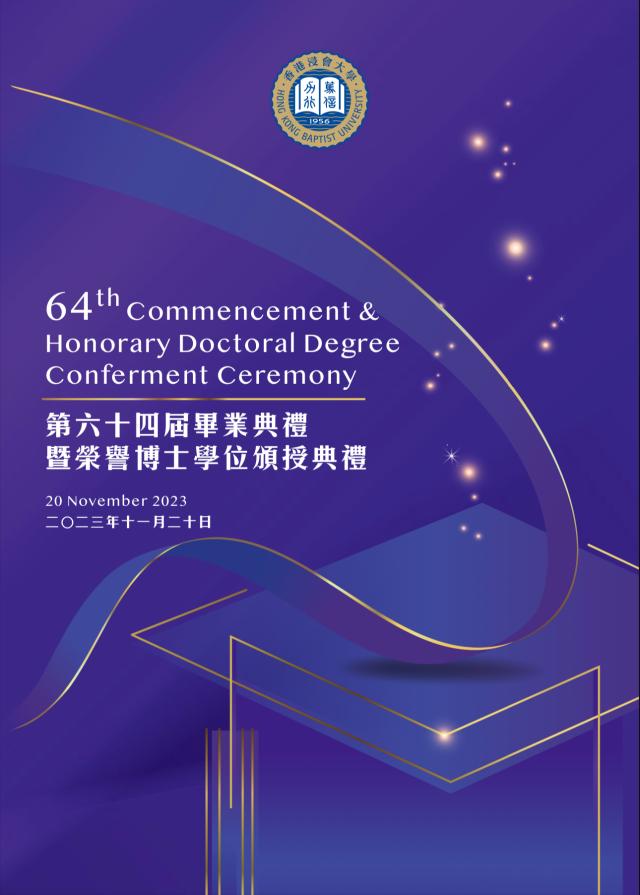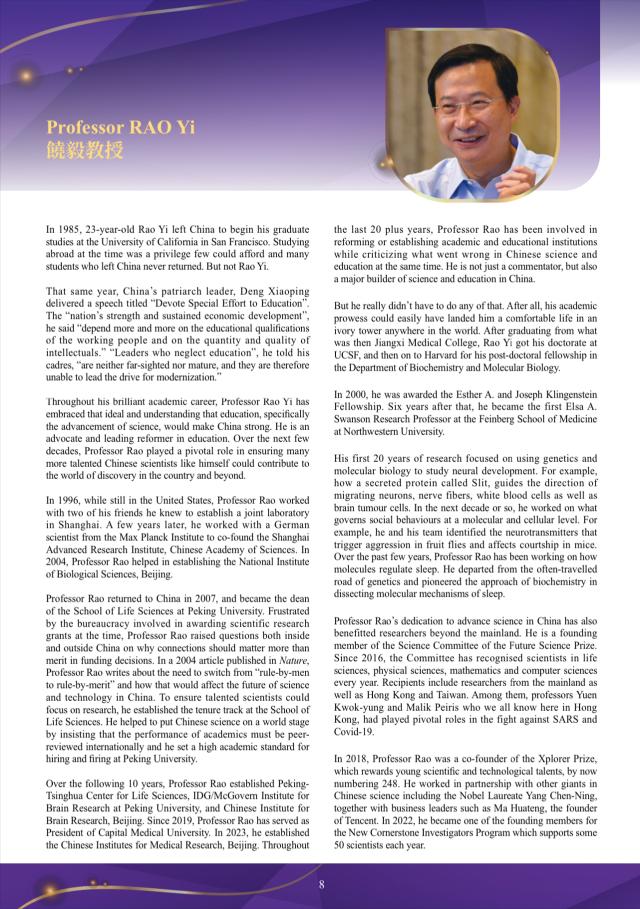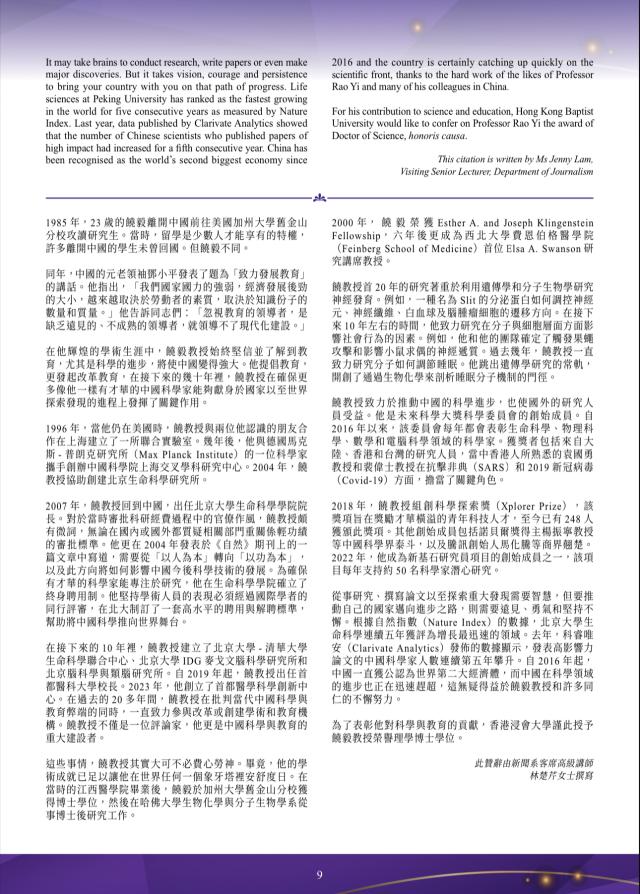饶毅教授获颁香港浸会大学荣誉理学博士
11月20日,北京大学饶毅教授在线获颁香港浸会大学荣誉理学博士学位,以表彰他对中国科学与教育事业的卓越贡献。
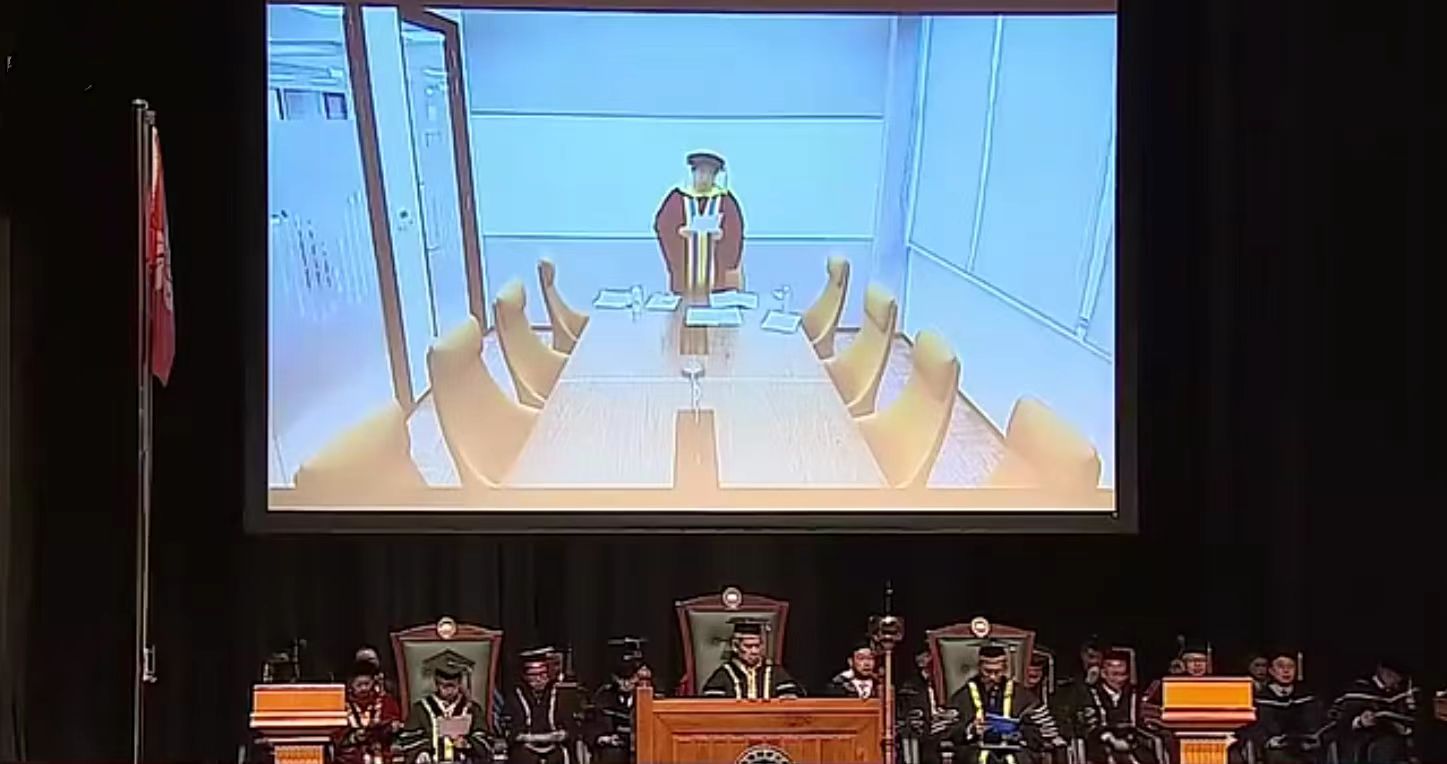
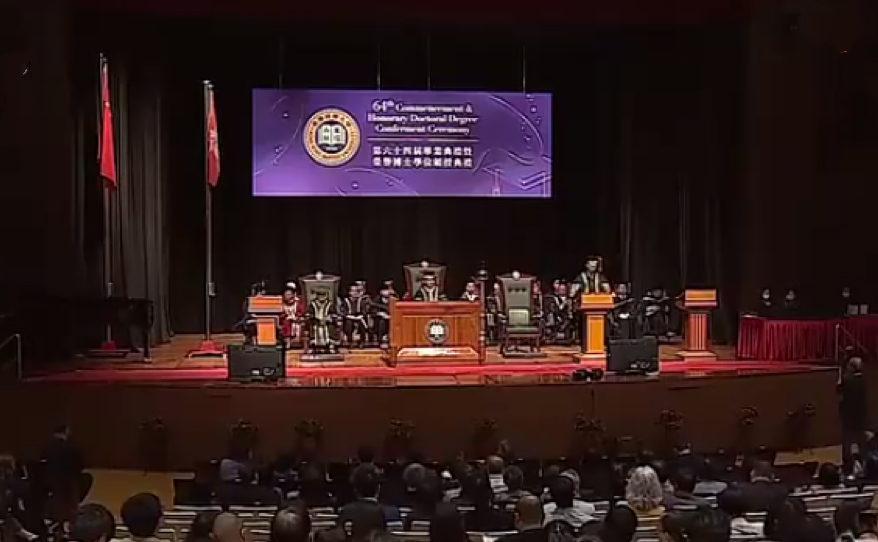
饶毅教授在线获颁香港浸会大学荣誉理学博士学位
香港浸会大学颁授荣誉博士学位,旨在表扬杰出人物的卓越成就及对社会的重大贡献。据悉,2003年物理学家丁肇中、2021年物理学家朱棣文分别获颁其荣誉理学博士,2010年外交家李肇星曾获颁其荣誉人文学博士。
颁授饶毅教授荣誉理学博士的陈述如下
1985年,23岁的饶毅离开中国前往美国加州大学旧金山分校攻读研究生。当时,留学是少数人才能享有的特权,许多离开中国的学生未曾回国。但饶毅不同。
同年,中国的元老领袖邓小平发表了题为“致力发展教育”的讲话。他指出,“我们国家国力的强弱,经济发展后劲的大小,越来越取决于劳动者的素质,取决于知识分子的数量和质量。”他告诉同志们:“忽视教育的领导者,是缺乏远见的、不成熟的领导者,就领导不了现代化建设。”
在他辉煌的学术生涯中,饶毅教授始终坚信并了解到教育,尤其是科学的进步,将使中国变得强大。他提倡教育,更发起改革教育,在接下来的几十年里,饶教授在确保更多像他一样有才华的中国科学家能够献身于国家以至世界探索发现的进程上发挥了关键作用。
1996年,当他仍在美国时,饶教授与两位他认识的朋友合作在上海建立了一所联合实验室。几年后,他与德国马克斯-普朗克研究所(Max Planck Institute)的一位科学家携手创办中国科学院上海交叉学科研究中心。2004年,饶教授协助创建北京生命科学研究所。
2007年,饶教授回到中国,出任北京大学生命科学学院院长。对于当时审批科研经费过程中的官僚作风,饶教授颇有微词,无论在国内或国外都质疑相关部门重关系轻功绩的审批标准。他更在2004年发表于《自然》期刊上的一篇文章中写道,需要从“以人为本”转向“以功为本”,以及此方向将如何影响中国今后科学技术的发展。为确保有才华的科学家能专注于研究,他在生命科学学院确立了终身聘用制。他坚持学术人员的表现必须经过国际学者的同行评审,在北大制订了一套高水平的聘用与解聘标准,帮助将中国科学推向世界舞台。
在接下来的10年里,饶教授建立了北京大学-清华大学生命科学联合中心、北京大学IDG麦戈文脑科学研究所和北京脑科学与类脑研究所。自2019年起,饶教授出任首都医科大学校长。2023年,他创立了首都医学科学创新中心。在过去的20多年间,饶教授在批判当代中国科学与教育弊端的同时,一直致力参与改革或创建学术和教育机构。饶教授不仅是一位评论家,他更是中国科学与教育的重大建设者。
这些事情,饶教授其实大可不必费心劳神。毕竟,他的学术成就已足以让他在世界任何一个象牙塔里安舒度日。在当时的江西医学院毕业后,饶毅于加州大学旧金山分校获得博士学位,然后在哈佛大学生物化学与分子生物学系从事博士后研究工作。
2000年,饶毅荣获Esther A. and Joseph Klingenstein Fellowship,六年后更成为西北大学费恩伯格医学院(Feinberg School of Medicine)首位Elsa A. Swanson研究讲席教授。
饶教授首20年的研究著重于利用遗传学和分子生物学研究神经发育。例如,一种名为Slit的分泌蛋白如何调控神经元、神经纤维、白血球及脑肿瘤细胞的迁移方向。在接下来10年左右的时间,他致力研究在分子与细胞层面方面影响社会行为的因素。例如,他和他的团队确定了触发果蝇攻击和影响小鼠求偶的神经递质。过去几年,饶教授一直致力研究分子如何调节睡眠。他跳出遗传学研究的常轨,开创了通过生物化学来剖析睡眠分子机制的门径。
饶教授致力于推动中国的科学进步,也使国外的研究人员受益。他是未来科学大奖科学委员会的创始成员。自2016年以来,该委员会每年都会表彰生命科学、物理科学、数学和电脑科学领域的科学家。获奖者包括来自大陆、香港和台湾的研究人员,当中香港人所熟悉的袁国勇教授和裴伟士教授在抗击非典(SARS)和2019新冠病毒(Covid-19)方面,担当了关键角色。
2018年,饶教授组创科学探索奖(Xplorer Prize),该奖项旨在奖励才华横溢的青年科技人才,至今已有248人获颁此奖项。其他创始成员包括诺贝尔奖得主杨振宁教授等中国科学界泰斗,以及腾讯创始人马化腾等商界翘楚。2022年,他成为新基石研究员项目的创始成员之一,该项目每年支持约50名科学家潜心研究。
从事研究、撰写论文以至探索重大发现需要智慧,但要推动自己的国家迈向进步之路,则需要远见、勇气和坚持不懈。根据自然指数(Nature Index)的数据,北京大学生命科学连续五年获评为增长最迅速的领域。去年,科睿唯安(Clarivate Analytics)发布的数据显示,发表高影响力论文的中国科学家人数连续第五年攀升。自2016年起,中国一直获公认为世界第二大经济体,而中国在科学领域的进步也正在迅速赶超,这无疑得益于饶毅教授和许多同仁的不懈努力。
为了表彰他对科学与教育的贡献,香港浸会大学谨此授予饶毅教授荣誉理学博士学位。
此赞辞由新闻系林楚芹女士撰写
In 1985, 23-year-old Rao Yi left China to begin his graduate studies at the University of California in San Francisco. Studying abroad at the time was a privilege few could afford and many students who left China never returned. But not Rao Yi.
That same year, China’s patriarch leader, Deng Xiaoping delivered a speech titled “Devote Special Effort to Education”. The “nation’s strength and sustained economic development”, he said “depend more and more on the educational qualifications of the working people and on the quantity and quality of intellectuals.” “Leaders who neglect education”, he told his cadres, “are neither far-sighted nor mature, and they are therefore unable to lead the drive for modernization.”
Throughout his brilliant academic career, Professor Rao Yi has embraced that ideal and understanding that education, specifically the advancement of science, would make China strong. He is an advocate and leading reformer in education. Over the next few decades, Professor Rao played a pivotal role in ensuring many more talented Chinese scientists like himself could contribute to the world of discovery in the country and beyond.
In 1996, while still in the United States, Professor Rao worked with two of his friends he knew to establish a joint laboratory in Shanghai. A few years later, he worked with a German scientist from the Max Planck Institute to co-found the Shanghai Advanced Research Institute, Chinese Academy of Sciences. In 2004, Professor Rao helped in establishing the National Institute of Biological Sciences, Beijing.
Professor Rao returned to China in 2007, and became the dean of the School of Life Sciences at Peking University. Frustrated by the bureaucracy involved in awarding scientific research grants at the time, Professor Rao raised questions both inside and outside China on why connections should matter more than merit in funding decisions. In a 2004 article published in Nature, Professor Rao writes about the need to switch from “rule-by-men to rule-by-merit” and how that would affect the future of science and technology in China. To ensure talented scientists could focus on research, he established the tenure track at the School of Life Sciences. He helped to put Chinese science on a world stage by insisting that the performance of academics must be peer-reviewed internationally and he set a high academic standard for hiring and firing at Peking University.
Over the following 10 years, Professor Rao established Peking-Tsinghua Center for Life Sciences, IDG/McGovern Institute for Brain Research at Peking University, and Chinese Institute for Brain Research, Beijing. Since 2019, Professor Rao has served as President of Capital Medical University. In 2023, he established the Chinese Institutes for Medical Research,Beijing. Throughout the last 20 plus years, Professor Rao has been involved in reforming or establishing academic and educational institutions while criticizing what went wrong in Chinese science and education at the same time. He is not just a commentator, but also a major builder of science and education in China.
But he really didn’t have to do any of that. After all, his academic prowess could easily have landed him a comfortable life in an ivory tower anywhere in the world. After graduating from what was then Jiangxi Medical College, Rao Yi got his doctorate at UCSF, and then on to Harvard for his post-doctoral fellowship in the Department of Biochemistry and Molecular Biology.
In 2000, he was awarded the Esther A. and Joseph Klingenstein Fellowship. Six years after that, he became the first Elsa A. Swanson Research Professor at the Feinberg School of Medicine at Northwestern University.
His first 20 years of research focused on using genetics and molecular biology to study neural development. For example, how a secreted protein called Slit, guides the direction of migrating neurons, nerve fibers, white blood cells as well as brain tumour cells. In the next decade or so, he worked on what governs social behaviours at a molecular and cellular level. For example, he and his team identified the neurotransmitters that trigger aggression in fruit flies and affects courtship in mice. Over the past few years, Professor Rao has been working on how molecules regulate sleep. He departed from the often-travelled road of genetics and pioneered the approach of biochemistry in dissecting molecular mechanisms of sleep.
Professor Rao’s dedication to advance science in China has also benefitted researchers beyond the mainland. He is a founding member of the Science Committee of the Future Science Prize. Since 2016, the Committee has recognised scientists in life sciences, physical sciences, mathematics and computer sciences every year. Recipients include researchers from the mainland as well as Hong Kong and Taiwan. Among them, professors Yuen Kwok-yung and Malik Peiris who we all know here in Hong Kong, had played pivotal roles in the fight against SARS and Covid-19.
In 2018, Professor Rao was a co-founder of the Xplorer Prize, which rewards young scientific and technological talents, by now numbering 248. He worked in partnership with other giants in Chinese science including the Nobel Laureate Yang Chen-Ning, together with business leaders such as Ma Huateng, the founder of Tencent. In 2022, he became one of the founding members for the New Cornerstone Investigators Program which supports some 50 scientists each year.
It may take brains to conduct research, write papers or even make major discoveries. But it takes vision, courage and persistence to bring your country with you on that path of progress. Life sciences at Peking University has ranked as the fastest growing in the world for five consecutive years as measured by Nature Index. Last year, data published by Clarivate Analytics showed that the number of Chinese scientists who published papers of high impact had increased for a fifth consecutive year. China has been recognised as the world’s second biggest economy since 2016 and the country is certainly catching up quickly on the scientific front, thanks to the hard work of the likes of Professor Rao Yi and many of his colleagues in China.
For his contribution to science and education, Hong Kong Baptist University would like to confer on Professor Rao Yi the award of Doctor of Science, honoris causa.
This citation is written by Ms Jenny Lam,
Department of Journalism
